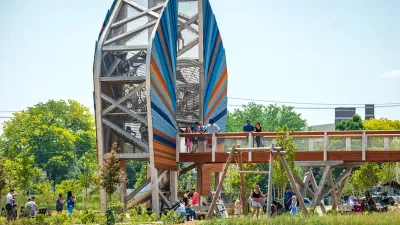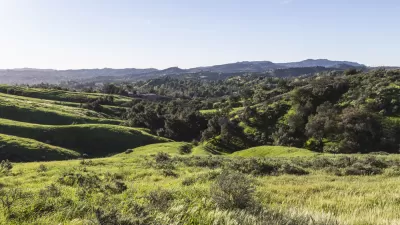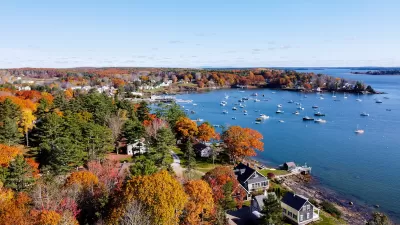Brooklyn Bridge Park's privately funded field house proposal, complete with Olympic-class velodrome, faces criticism over its size, effects on the surrounding neighborhood, and arguments over open space versus space for sports facilities.
Brooklyn Bridge Park, the nascent 85-acre waterfront park still under development, received a $40 million gift from New York native Joshua P. Rechnitz in April - "the largest single gift in the history of New York City's parks system" - for the construction of a field house, complete with a velodrome. As Lisa Foderaro reports for The New York Times, the stadium would allow for almost 2,500 spectators to watch the track-cycling sport on a 200 meter track.
Despite the donor's generosity, some worry about the stadium's effects on the character of the park itself as well as the surrounding neighborhood. "Joan Zimmerman, president of the Fulton Ferry Landing Association, another community group," reports Foderaro,"said she worried that the park was already being nibbled away by structures. 'Putting this large of a building at one of the narrower necks of the park raises the question of what's more important: green space or buildings?' she said."
Others are questioning Rechnitz himself, "he is an avid amateur track cyclist who has tried - and failed - to bring a velodrome to the city. Now, they say, he is buying the track he wants, on public land," says Foderaro.
Others see the stadium as beneficial. "Regina Myer, president of the Brooklyn Bridge Park Corporation, which governs land use in the park, emphasized that 'it's not taking away any green space; the plan always called for that location to be a maintenance building.'"
Still, in order to develop a velodrome on park land, approval from the Brooklyn Bridge Park Corporation, in addition to approval from the state, must be secured.
FULL STORY: A $40 Million Gift, a Proposed Bike Arena, and Now Skepticism in Brooklyn

Alabama: Trump Terminates Settlements for Black Communities Harmed By Raw Sewage
Trump deemed the landmark civil rights agreement “illegal DEI and environmental justice policy.”

Planetizen Federal Action Tracker
A weekly monitor of how Trump’s orders and actions are impacting planners and planning in America.

The 120 Year Old Tiny Home Villages That Sheltered San Francisco’s Earthquake Refugees
More than a century ago, San Francisco mobilized to house thousands of residents displaced by the 1906 earthquake. Could their strategy offer a model for the present?

Ken Jennings Launches Transit Web Series
The Jeopardy champ wants you to ride public transit.

BLM To Rescind Public Lands Rule
The change will downgrade conservation, once again putting federal land at risk for mining and other extractive uses.

Indy Neighborhood Group Builds Temporary Multi-Use Path
Community members, aided in part by funding from the city, repurposed a vehicle lane to create a protected bike and pedestrian path for the summer season.
Urban Design for Planners 1: Software Tools
This six-course series explores essential urban design concepts using open source software and equips planners with the tools they need to participate fully in the urban design process.
Planning for Universal Design
Learn the tools for implementing Universal Design in planning regulations.
Clanton & Associates, Inc.
Jessamine County Fiscal Court
Institute for Housing and Urban Development Studies (IHS)
City of Grandview
Harvard GSD Executive Education
Toledo-Lucas County Plan Commissions
Salt Lake City
NYU Wagner Graduate School of Public Service





























